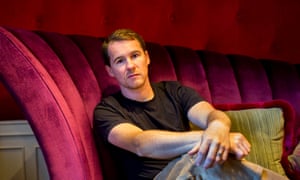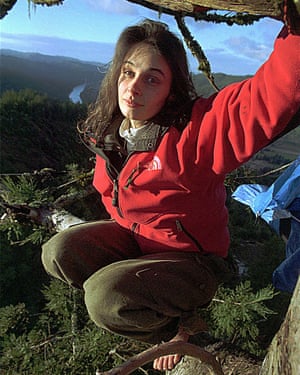
Turtle Alveston, the 14-year-old heroine of My Absolute Darling, one of the most talked-about novels of the year, eats raw eggs for breakfast, cracking them into her open mouth. She sleeps on the floor, skins and roasts rabbits over a fire of dried grass and is an expert shot, spending her evenings meticulously cleaning guns. She even snacks on scorpions. Turtle is “a person of great strength and personal resources and courage,” her creator, 30-year-old Gabriel Tallent tells me. But he adds: she’s “a girl who’s lost.”
Turtle lives in a ramshackle house on the northern California coast with Martin, her survivalist father; the windows are boarded up, cooking pans are left to be licked clean by raccoons. There are supplies of dried food in the basement – humanity is “slowly, ruinously … shitting in its bathwater”, Martin tells his daughter – and the gravel drive is littered with bullet casings. Turtle’s father is charismatic, macho and handsome, an eloquent self-taught philosopher with a deep feeling for nature: Tallent describes him to me as “visionary”. He is at times a “tender” father and certainly a loving one. He’s also a monster, who verbally, physically and sexually abuses Turtle, and insists on exerting total control over her. “You are mine”, he growls. She adores him and hates him and knows she needs to escape.
In the excitement that has built around My Absolute Darling, an unsolicited blurb by Stephen King has played a crucial role. He has called Tallent’s debut novel a “masterpiece” to rival To Kill a Mockingbird and Catch-22. Its publishers have breathlessly proclaimed a “literary and commercial marvel”. The beauty of Tallent’s writing has been praised, but so has the novel’s action-packed thriller plot. The pages turn quickly, and the reader keenly wants Turtle to prevail. When it was published last week, one review concluded: “For once, believe the hype.”
Tallent’s own absorption with the landscape of Mendocino County, where the novel is set, comes through vividly as Turtle catches eels in rock pools and explores barefoot a wilderness of bishop pines and huckleberry. Equally significant is the author’s evident intent to write a powerful female character. “I wanted her restraint and dignity to burn through the page”, he has said. “I wanted to write her so that the damage we do to women would appear to you, as it appears to me, real and urgent and intolerable.” The two themes, he tells me, were always linked in his mind: we harm “the things most important to us” – as Martin does Turtle, as humanity does the environment – “because we fail to see that they aren’t really ours”.
Tallent grew up near Mendocino, whose reputation as a hippy retreat was established in the late 1960s and 70s. His parents separated when he was five, and he was raised by his mother, the writer Elizabeth Tallent, and her wife, Gloria Rogers. (His father, a carpenter, now lives in Illinois.) Albion Ridge, his home for years, had a “strong back-to-the-land lesbian movement … it was a little before my time, but those ideas were still very much in the air”. The high school he attended was tiny and progressive: every morning the 70 or so students held hands and did a breathing meditation, before discussing the issues of the day.
“My parents modelled intellectual precociousness,” Tallent says. “Elizabeth is hyper-eloquent” on issues of feminism; “Gloria is a wonderful interlocutor, with a terrific sense of justice; she’s a very honest person”. He was an only child in a house “saturated with literature, ideas, discussions”; the family would read Dickens aloud at night, and their cats were named after feminist icons (“Cixous would wander in and out”). Tallent loved to go “bushwacking along the ridge, and I’d take a copy of the Iliad, which – and this shows you what a strange kid I was – I very much wanted to memorise in order to impress young women.” He laughs: “It never panned out that way.”

His was a free-range childhood: “Any time I had was spent down in the streams, along the banks, looking for salamanders. The woods were this incredible place that yielded excitement and adventure around every turn.” As one of his school projects, he interviewed a local activist who for over 700 days lived in the canopy of Luna, an ancient redwood tree. “I talked about global warming incessantly, and have carried that sense of alarm with me … Being passionate about ideals always opens you up to criticism from more jaded people, so one is slightly embarrassed to believe in justice and kindness and such things, but I did very much and I still do.”
My Absolute Darling, which took eight years to write, started out as an “ideas-driven book, about ecological disaster … But I turned out not to be … didactic”. At university in Oregon, Tallent began a work of fiction set in the Pacific Northwest with a large cast of characters including dope-growers, anarchists and drop-outs. He researched local plants – knowledge that adds a specificity to the lushness of his nature writing – and guns. After college, when he worked as a waiter in a restaurant, he “spent a huge chunk” of what money he had on guns, and much time shooting them: “I felt I needed to vet every moment in the book critically and not rely on unexamined assumptions.”
At a certain point, the painstaking Tallent realised that his best writing centred on the character of Turtle. “We need more books like this,” he says, “about survivors and abuse.” (His novel is bound to draw comparisons with Hanya Yanagihara’s recent A Little Life, which also depicts a childhood of sexual assault and torture.)
My Absolute Darling – the title comes from one of Martin’s endearments – is, at times, upsetting, explicit and difficult to read. In one scene, her father forces an exhausted Turtle to do pull-ups from a rafter while he holds a knife between her legs. Rape scenes are described graphically. Turtle has internalised her father’s misogyny and cruelty, and on one occasion she injures a 10-year-old girl that Martin brings home. Tallent is sensitive to any suggestion that the novel veers into voyeurism or exploitation. “I felt I was writing across a gap of privilege and I could not be cavalier. Of course I was aware … At college I studied Pamela, perhaps the first English novel, about a young woman who endures a protracted imprisonment, and accusations that the book exploited this young woman’s experience for the audience’s titillation were rampant.”
Amid the adulation, early criticisms of the book have accused Tallent of doing exactly what he set out not to do – write Turtle as a stereotype, with her ‘coltish’ physique and ‘crooked’ mouth, a teenage girl who’s attractive but believes she’s ugly. She struggles at school but is then instantly brilliant once she puts her mind to it. When she’s anguished, she chews her knuckles. A critic in the New York Times has argued that she is “almost devoid of interiority … What we’re left with is an action hero, a kind of male fantasy figure out of Mad Max: Fury Road”. The high-school boys who Turtle befriends themselves joke that she’s a ninja, “the chainsaw-wielding, shotgun-toting, Zen Buddhist, once-and-future queen of post-apocalyptic America”.He wanted Turtle to be a real character, not a symbol or poster child. “There is a natural reluctance to showing her doing anything wrong”, Tallent insists, but if you efface any aspect of her experience, it’s “bullshit … I took the risk.”
As an intense teenager, Tallent not only transcribed Plato’s dialogues for fun, but was a pulp fiction addict. He loved adventure stories “about how to be courageous and survive … how to be a good person when the stakes are high and the odds are stacked murderously against you”. This, at one level, is Turtle’s story. I ask if the violent showdown of the novel was influenced by cinema: “I didn’t watch many movies as a kid,” he replies, “I don’t watch many movies now. But I try to be a visual writer, and I wanted to capture the hectic-ness of bad situations.”
Tallent is clearly drawn to bad situations: his next book will focus on trauma and friendship among climbers in Utah, where the novelist now lives with his wife. He is a fanatic climber, and gives a terrifying description of an ascent one morning when his footholds were so small he was ‘stepping into air’ and the slowly warming rockface became alive with wasps.
With its distinctive blend of serious purpose and pulse-quickening action – Plato and pulp – My Absolute Darling is set to guarantee the kind of success that will change Tallent’s life. He isn’t part of a literary scene, and is eager to point to the hundreds of excellent books that aren’t lavished with such attention. How do his climbing friends regard his new celebrity status? “They don’t think I’m hot shit,” he smiles. “They’re thrilled, but what they like is getting drunk with me. It’s not like I’ve risen in their esteem.”
- My Absolute Darling is published by Fourth Estate. To order a copy for £11.04 (RRP £12.99) go to bookshop.theguardian.com or call 0330-333 6846.

No comments:
Post a Comment